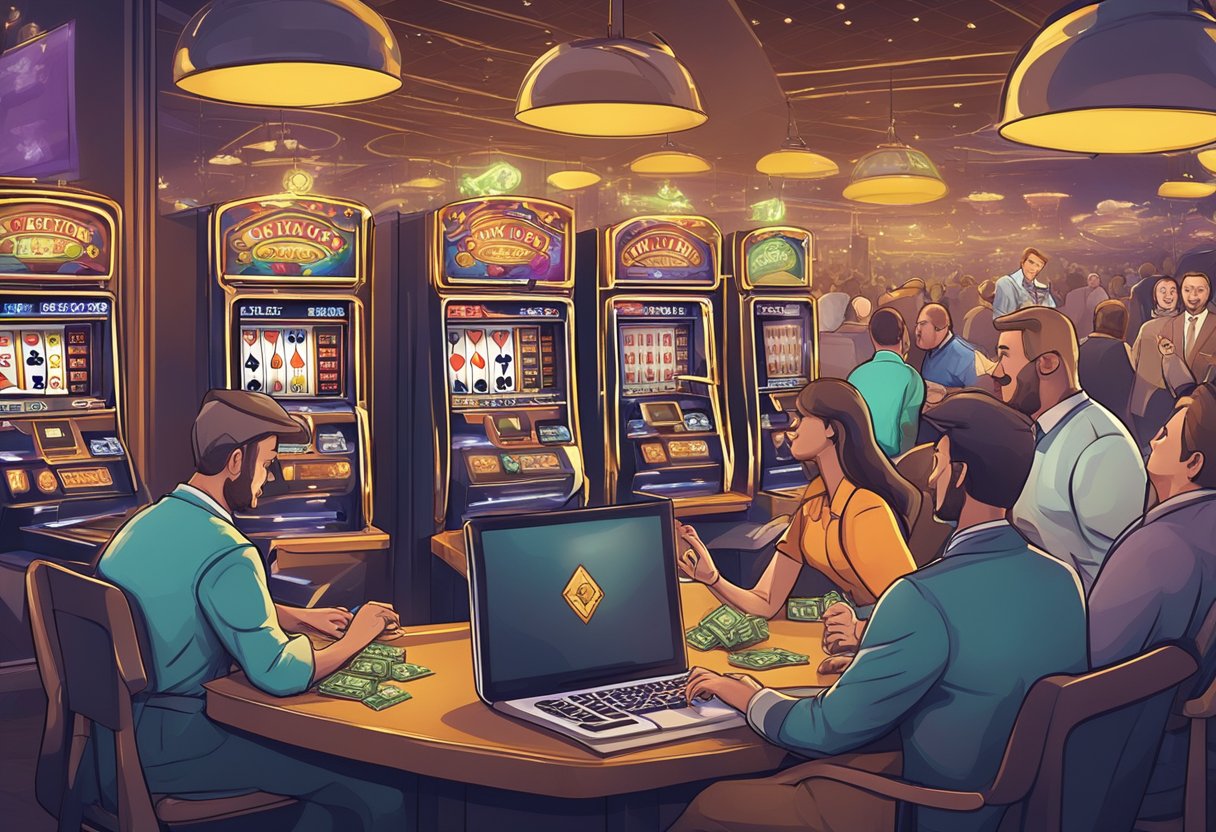The proliferation of online casinos in recent years has given rise to new economic dynamics within the gambling industry. These digital platforms have not only revolutionised the way people bet but have also echoed through the broader economy. The innovation and growth in the online casino sector have facilitated job creation and contributed to the necessary infrastructure for the digital age.
As these virtual betting establishments gain popularity, they bring about meaningful changes in financial trends and employment patterns. The industry’s influence on the financial market is multi-faceted, affecting everything from technology adoption to consumer spending. Additionally, the online casino industry has become a significant employer, providing jobs in technology, customer service, and compliance, thereby influencing the labour market in ways traditional industries have not.
Key Takeaways
- Online casinos are significant contributors to job creation and infrastructure development.
- The industry influences diverse aspects of financial trends, including technology and consumer spending.
- The labour market is shaped by online casinos offering varied employment roles beyond traditional norms.
Need Help Beating the Bookies?
Our expert betting tipsters have been taking cash off the bookies since 2014! If you need a helping hand with winning then why not check them out?
Browse Our Tipsters
The Outside Edge
Simple Yet Effective Horse Racing Tips from an Experienced Industry Expert
Visit PROFILE
Systematic Betting
Simple and Effective Horse Racing Tips from a Hugely Popular Member of the Team
Visit PROFILEOverview of the Online Casino Industry
The online casino industry, often referred to as the iGaming industry, represents a considerable segment of the global gaming market. It encapsulates an array of gambling activities carried out over the internet, including traditional games like poker and blackjack, innovative slot machines, and sports betting. Technological advancements are at the heart of the industry’s expansion, with platforms utilising artificial intelligence (AI), augmented reality (AR), and virtual reality (VR) to offer immersive experiences to users.
Contrasted with land-based casinos, online platforms provide gamers with the convenience of remote play, accessible from anywhere with internet connectivity. This digital transformation has contributed greatly to the industry’s boom, broadening gaming’s reach beyond brick-and-mortar establishments into the digital realm.
| Aspect | Detail |
|---|---|
| Revenue | Substantial, with billions generated annually |
| Employment | Over 13,000 individuals employed in the UK (2023) |
| Popular Games | Slots, sports betting |
| Technological Use | AI, AR, VR to enhance user experience |
| Accessibility | Available remotely, increasing market penetration |
The online gambling market has witnessed consistent growth, propelled by innovation and the increasing pervasiveness of smartphones and laptops. This growth is reflected in financial trends, signifying the industry’s effect on the wider economy. The role of internet casinos as an employment driver adds a positive note to this narrative, with thousands of jobs attributed to the sector. These roles vary from tech-related positions that focus on the maintenance and advancement of the platform to customer service roles that handle user interactions.
In summation, the online casino industry is a dynamically evolving sector with its growth influenced heavily by technological improvements and digitalisation. With each leap forward in tech, the industry redefines itself, continuously reshaping the economic landscape in the process.
Economic Impact of Online Casinos
Online casinos have become significant players in economic landscapes, especially in regions like the UK and Europe. They contribute not only to tax revenues but also drive employment and investment, influencing overall economic growth.
Contribution to Tax Revenue
The emergence of online casinos has led to substantial tax revenue for governments. In the UK, for example, online gambling ventures are subject to various taxes, including corporate tax, Value-Added Tax (VAT), and specific gambling duties. This taxation framework ensures that a fraction of the revenues generated by this industry feeds into the public treasury, supporting national and local economic development.
- Corporate tax: A standard rate applied to the profits of the enterprise.
- VAT: Applied to the goods and services offered by online casinos.
- Gambling duties: These may include Remote Gaming Duty for online operators.
Employment Opportunities Created
Jobs stemming from the online casino industry are varied, including customer service representatives, marketing specialists, technical support staff, and software developers. These opportunities are not restricted to direct employment within the casino operations but also extend to associated industries like construction companies, involved in the development of physical sites for servers and offices, and software development firms that create and maintain the gaming platforms.
- Direct employment: In digital operations and customer interfacing roles.
- Indirect employment: Such as construction and software development for supporting infrastructure.
Investment and Growth
Online casinos fuel economic growth by attracting investments into technology and infrastructure. The industry’s expansion is poised to create further job opportunities across global economies. Studies indicate that significant investment in technological innovation is crucial for maintaining the competitiveness of online casinos. Beneficiaries of these investments often include IT firms, software houses, and security experts. Such investments bolster regional economies by diversifying the economic base and promoting ancillary sectors like tourism.
- Technological investment: Spurring advancements in security, game design, and platform usability.
- Economic diversification: Supporting ancillary industries and regional economic growth.
Regulatory Environment and Compliance

The regulatory environment for online casinos is integral to the economic impact and employment within the gambling industry. It establishes frameworks for licensing, consumer protection, and ensures responsible gambling practices.
Licensing and Government Regulations
Regulations set by governments and regulatory bodies directly influence how online casinos operate. In the United Kingdom, the UK Gambling Commission is responsible for overseeing the gambling industry, issuing licences, and monitoring compliance. Casinos must adhere to strict regulations to obtain and maintain their licences, which include paying licensing fees and demonstrating a commitment to consumer protection and corporate social responsibility.
- Regulatory Compliance: Casinos must comply with a range of laws and regulations that cover areas such as fairness of games, protection of customer funds, and the prevention of money laundering.
- International Considerations: Online casinos often operate across international borders, necessitating compliance with multiple regulatory frameworks, which can include the US and other jurisdictions.
Consumer Protection and Responsible Gambling
Consumer behaviour is a major consideration in the regulation of online casinos, with a focus on preventing problem gambling and under-age gambling. Regulatory compliance ensures that safety and security measures are in place to provide a safe gaming experience.
- Responsible Gambling: Tools and resources are provided to help individuals control their gambling. This includes self-exclusion schemes, limit-setting tools, and access to support for those affected by addiction.
- Social Responsibility: Casinos are expected to operate with a high degree of social responsibility, actively detecting and preventing problematic gambling behaviour and ensuring that information about the risks of gambling is clear and accessible.
The measures ensure that the gambling environment is regulated to promote fairness, safety, and a positive impact on the economy, while addressing concerns such as addiction and problem gambling.
Employment and Industry Dynamics
The expansion of online casinos has influenced the job market significantly, introducing new roles and necessitating a diverse range of skills.
Job Market Evolution
As the online casino industry thrives, it contributes to job creation and influences employment rates. New employment opportunities are generated within these sectors, mitigating unemployment rates to some extent. Casinos and online casinos have become noteworthy employers both in the UK and globally. They offer various job opportunities from customer support representatives to software developers and marketing specialists. Additionally, with the integration of artificial intelligence (AI) and machine learning, roles that manage and improve these technologies are in demand.
The sector’s employment reach extends to live dealer games, where there is a necessity for live dealers who can host and manage games. The need for live dealers has maintained a human element in the gambling industry, ensuring that not all aspects of the casino experience are automated.
Skills and Roles Emerging in the Sector
Within the online casino industry, job creation goes hand in hand with the emergence of new skills and roles. AI and machine learning innovations require specialised knowledge, leading to a greater need for professionals adept in these fields. Software developers play a crucial role in creating and maintaining the platforms that online casinos operate on. They must possess a strong understanding of multiple programming languages and frameworks.
Moreover, customer support representatives are crucial for maintaining customer satisfaction and loyalty. These professionals must be equipped with excellent communication skills and a deep understanding of the casino’s operations and policies. Marketing specialists also hold significant importance in the sector, crafting strategies to attract and retain users, which is essential for the casino’s economic sustainability. The dynamism of the online casino industry has introduced a spectrum of employment opportunities, each necessitating a specific set of skills.
Social and Cultural Considerations

In analysing the impact of online casinos, it is pivotal to consider the intricate relationship they maintain with social and cultural factors, particularly in the context of tourism and their integration within local economies.
The Relationship Between Casinos and Tourism
Casinos often act as a magnet for tourists, seeking entertainment options beyond traditional historic and cultural attractions. The linkage between casinos and tourism is clear:
- Casinos as Tourist Attractions: They serve as entertainment hubs, complementing a region’s tourist offerings and sometimes act as the primary reason for a visit.
- Boost to Ancillary Services: Establishments such as restaurants, hotels, and retail outlets benefit from the increased footfall.
Tourism, in turn, contributes to the urban development of the area, with local communities witnessing a transformation in infrastructure and customer service quality due to the demand created by tourists.
Economic Integration Within Local Communities
Casinos can have a prominent role in regional economies and local community landscapes through:
- Employment Opportunities: They create jobs not only within the casino but also in hospitality and other ancillary industries.
- Cultural Considerations: Whilst casinos may introduce new cultural elements to a region, they also need to adapt to existing cultural norms and values.
- Support for Local Businesses: The influx of visitors often translates to increased business for local merchants, thereby integrating the casino industry within the local economy.
- Urban Revitalisation: In some urban areas, the establishment of a casino can lead to urban regeneration projects, improving infrastructure and public amenities.
It is crucial for local authorities to manage this integration to ensure that the benefits are evenly distributed and that any potential negative consequences are mitigated.
Technological Advancements in Online Gambling
The online gambling sector has seen a quantum leap in innovation, fundamentally altering the gaming experience and heightening security measures. The deployment of cutting-edge technologies by software developers is vital to these advancements.
Innovations in Gaming Experience
Software Developers have been the driving force behind transformative changes in the online casinos landscape. The application of AI and machine learning algorithms has introduced a level of personalisation in the gaming industry previously unattained. These technologies enable systems to analyse and respond to consumer behaviour accurately, offering customised game recommendations and incentives that foster player engagement.
The utilisation of blockchain technology infuses a layer of transparency and fairness into games while facilitating secure, decentralised transactions. Additionally, the advent of streaming services and digital platforms has enhanced the live dealer aspect of games, providing an immersive, real-time gaming experience that bridges the gap between virtual and brick-and-mortar casinos.
- Innovation Highlights:
- AI & Machine Learning: Tailored player recommendations
- Blockchain: Enhanced transparency and security
- Real-Time Streaming: Live dealer experiences
Security and Cybersecurity Concerns
Security within the online gambling sector is paramount, with cybersecurity becoming a major aspect of software development. Online casinos continually invest in advanced security protocols to ensure the safeguarding of player information and financial integrity. Data protection has taken centre stage, with encryption technologies and secure networks being at the core of these efforts.
The role of blockchain extends beyond transactions to bolster cybersecurity. By leveraging its distributed ledger system, online gambling platforms can secure data against tampering and breaches. This not only instils confidence in the consumers but also complies with stringent international regulations concerning digital data protection.
- Security Measures:
- Encryption Technologies: Protecting data in transit and at rest
- Blockchain in Security: Preventing data breaches with decentralisation
Through these advancements, the online gambling industry has fortified its economic position and contributed to the broader technological ecosystem, enhancing both user experience and security.
The Role of Hospitality and Ancillary Services
The integration of hospitality and ancillary services is pivotal in magnifying the economic influence of online casinos, not just within gambling domains but across the associated sectors that fuel visitor, customer service, and infrastructural demands.
Impact on Hotels and Restaurants
Casinos, especially those that also have physical premises, act as significant drivers for hospitality sectors such as hotels and restaurants. They frequently partner with local businesses, bolstering occupancy rates and increasing patronage.
- Hotels often experience a boost in reservations due to casino patrons seeking accommodation, leading to an enhanced demand for lodging services.
- Restaurants in proximity to casinos benefit from a diversified customer base, including gamblers, casino staff, and tourists drawn by the entertainment offerings.
Importance of Customer Services and Support
The emphasis on customer service within the casino ecosystem cannot be overstated and catalyses a domino effect across numerous support roles and services.
- Customer service representatives play an indispensable role, ensuring patrons receive prompt and courteous assistance, which directly relates to repeat patronage and overall client satisfaction.
- Behind the scenes, technical support staff are essential, maintaining the seamless operation of online gaming platforms which, consequently, upholds the integrity of the customer experience.
By nurturing these interconnected industries, online casinos extend their economic impact well beyond the immediate sphere of gambling, underscoring the importance of hospitality and quality customer experiences in creating a sustained, positive economic trajectory.
Impacts on Public Perception and Behaviour

This section explores how online casinos affect public opinion and individual behaviours in relation to online gambling.
Changing Attitudes Towards Online Gambling
Online casinos have notably shifted public attitudes towards gambling. As access to digital platforms increases, so does the acceptance of gambling as a form of entertainment. A wider demographic is engaging with online gambling, and it is no longer seen as an activity solely for a niche group. Despite this, concerns about responsible gambling and problem gambling continue to shape the way people view the industry. These concerns drive calls for the gaming industry to implement more robust measures to protect vulnerable individuals.
The Role of Marketing and Branding
Marketing strategies and branding have played a critical part in shaping consumer behaviour towards online casinos. Powerful branding and targeted marketing campaigns can create a positive image of online gambling brands, emphasising the fun and potentially lucrative aspects of the activity. However, this same marketing must also walk a fine line, as it is essential to promote responsible gambling and avoid appealing to minors or those at risk of addiction. The industry faces a delicate balance, trying to promote their product while upholding a high standard of social responsibility.
Comparison with Other Segments of the Gambling Industry
The performance of online casinos and their influence on the economy are often measured against other segments of the gambling industry, particularly land-based casinos and the burgeoning mobile gaming sector.
Online vs Land-Based Casinos
Employment Statistics: In 2023, land-based casinos in the UK continued to be substantial employers, with over 13,000 individuals drawing their livelihood from this sector. Comparatively, online casinos also have a noteworthy impact on job creation, although the exact figures tend to vary due to the digital nature of the jobs, which may not always be confined to geographical boundaries.
Economic Contribution: While a brick-and-mortar casino contributes to the local economy through direct employment and tourism, an online casino has a wider reach, potentially influencing financial trends on a global scale. The revenues generated by online casinos contribute significantly to the economy, just like their land-based counterparts—although the exact financial mechanisms differ due to the digital transaction methods and broad market accessibility.
Mobile Gaming and iGaming Trends
Growth Projections: The iGaming industry, which encompasses online and mobile gaming, is on a sharp trajectory for growth. It was estimated to be worth about $53 billion in Europe with an annual growth rate projected at 11.5% until 2027, indicating a fast-paced expansion when compared to other segments.
Consumer Patterns: Mobile gaming has revolutionised the way consumers interact with the gambling industry. The convenience of accessibility through mobile devices means a broader demographic is engaging with this segment. This has also pushed for innovative approaches to iGaming, with developers constantly enhancing user experience to maintain competitiveness within this flourishing market.
Forecasting the Future
The gambling sector’s trajectory offers insightful prospects into how online casinos will shape economies and labour markets. Anticipating market shifts and technological integration is essential for forecasting the future of this dynamic industry.
Potential Market Developments
Economic forecasts indicate a robust growth trajectory for online casinos. By leveraging market analysis, it’s evident that trends in consumer behaviour and investment in this sector suggest a potential increase in its economic weight. Future trends are shaped by global market developments, with Europe’s online gambling industry destined to reach substantial valuations by the end of the decade.
- Projected Growth: The European online gambling market value is anticipated to surge from $53 billion to $100 billion by 2027, expanding at an annual rate of 11.5%.
The gaming industry is not only increasing in value but also diversifying its offering, driving employment in various sectors ranging from software development to customer service. This presents tangible growth opportunities, and thus, potential for heightened economic influence.
- Employment Opportunities: Online casinos contribute to job creation across disciplines, positively influencing local economies with new and sustainable roles.
Adapting to New Technologies and Innovations
Technological advancements are fundamentally transforming online casinos. Innovation in this context encompasses the adoption of established tech like artificial intelligence and machine learning for enhancing user experience and security, as well as nascent technologies such as blockchain for payment processing and augmented reality (AR) and virtual reality (VR) for immersive gaming experiences.
- Blockchain Use: Increased utilisation of blockchain technology is anticipated, aiming to provide enhanced security and transparency in transactions.
- AR and VR Potentials: Immersive experiences offered through AR and VR are expected to attract a wider audience and create differentiated products within the gaming industry.
By progressively integrating these innovations, online casinos sustain their market position and continue to incite consumer interest, thereby maintaining their role as a significant contributor to economic and employment landscapes.
Frequently Asked Questions
The rise of online casinos has significant ramifications for the economy and job market, sparking various inquires into their impact.
What repercussions do gambling establishments have on regional economic activity?
Casinos can stimulate local economies through increased tourism and consumer spending. They may also contribute to the revitalisation of nearby businesses by attracting a steady flow of patrons.
In what ways does the proliferation of online casinos stimulate employment opportunities?
The expansion of the online casino industry creates jobs not only within the casinos themselves but also in sectors such as software development, customer service, and compliance. The UK casino industry alone employed over 13,000 people in 2023.
What are the distinctive economic advantages associated with the legalisation of online betting?
The legalisation of online betting facilitates economic advantages like enhanced consumer protection, regulated marketplaces that promote fair play, and the establishment of new tax revenues from licensed operators.
How might the taxation of virtual casinos contribute to governmental revenue?
The taxation of virtual casinos provides a new source of governmental revenue, which can then be utilised for public services and infrastructure. For instance, the increase in online wagering during 2021/22 alone rose to 61% of the total Gross Gambling Yield (GGY) in the UK.
What negative economic outcomes can arise from the induction of digital gambling platforms?
Potential negative economic outcomes include concerns over problem gambling, which may lead to social costs, and the challenge to existing brick-and-mortar casinos, which could face a decline in customers shifting to online platforms.
How does the development of the electronic gambling sector interface with overall economic growth?
The electronic gambling sector’s development correlates with technological advancements and consumer behaviour shifts. Its growth contributes to broader economic trends, with the worldwide online gambling revenue seeing a 5.9% increase.





